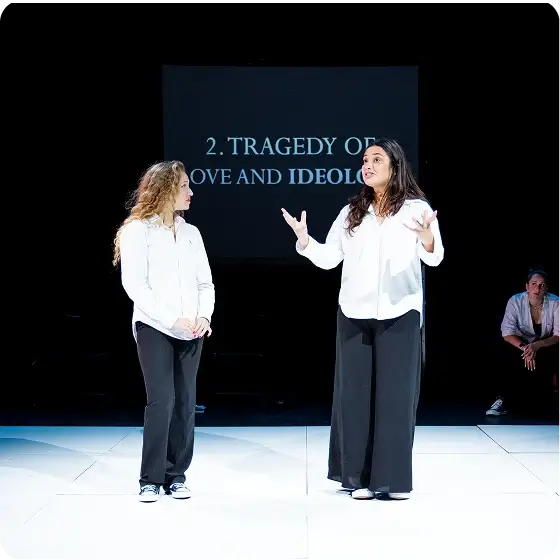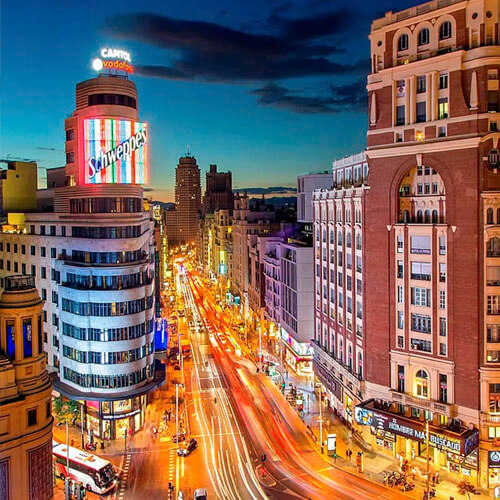How to become a a stage actor in Barcelona?
Barcelona has a really diverse, vibrant, politically engaged, and artistically rich stage culture that has developed in unique and very particular ways that have to do with language, identity and a way of living that’s both widely inclusive and slightly scared of change. From grand public theatres to private productions and independent collectives, the opportunities to work here as an actor are real, but so are the challenges. Catalan stage culture works differently from other places when it comes to visibility and work opportunities. There’s no specific ladder to climb in Catalunya. No established way of doing things. No single audition mailing list. No centralised agency system that guarantees you’ll be seen. Instead, what will guarantee that you’ll be seen, is that you’re actually seen. Networking is the key, and creating relationships might be much more effective than having the best headshots taken.
This article aims to give you a practical overview of how the Catalan stage scene (mostly) works: where to look for an audition, how to build connections, an outline of some of the companies that are producing exciting work right now, and some playwrights that are shaping the Catalan stage today.
Let’s dive in.
The audition scene for theatre in Barcelona
So, how do you actually get in the room here? Let’s talk about auditions.
First of all, here’s the key thing to understand: the audition scene in Barcelona is not centralized, not heavily advertised, and definitely not standardized the way it might be in other places like the UK or the US. There’s no universal platform like Spotlight or Backstage, and many castings happen either through direct contacts, internal calls within companies, or closed auditions where you only get in if you’re already part of a director’s or producer’s network.
As discouraging as it might sound at first, this actually reflects a broader truth about the scene here: Barcelona is a relationship-based city when it comes to theatre. People usually work with people they know. That means your best way in is – and I cannot stress this enough – to be present. Go see work, talk to artists after performances, get to know other artists that share your interests, take workshops, do readings, volunteer at festivals. Anything that puts you in the room and lets people know you’re serious about being part of the local ecosystem will get you much further than any agent could.
Production companies that hold open calls
That said, open auditions do happen, and they have been happening more and more, as the Catalan scene slowly opens to new and emerging unknown talent. This is especially true for larger venues or festivals, but there’s also some stable companies that made it their explicit policy to hold open calls when they create new work. Here’s some places to keep on your radar:
Teatre Nacional de Catalunya (TNC)
TNC sometimes publishes open calls on their website, though a large part of their casting is done through closed calls or industry connections.
Sala Beckett
Sala Beckett, though more focused on contemporary Catalan playwriting, often hosts labs or workshops that might double as informal audition opportunities (again, it’s all about the connections you build).
Teatre Lliure
Teatre Lliure occasionally posts castings in the same fashion.
Parking Shakespeare
Parking Shakespeare holds open calls once a year, usually around springtime. Their summer productions in public parks are well-loved, free to the public, and offer a great way to gain visibility in the local scene. They work in Catalan, and their casting process is transparent and welcoming to emerging talent.
Instagram and Social media are real tools here. Theatre companies like La Calòrica, El Eje, or Casa Real often post casting calls or collaborative projects through social media. Following their pages and engaging with their work goes a long way.
Do you need to be a part of the actor’s union to work in Barcelona?
The short answer? No.
The longer answer may be a bit less clear, but it will help you understand why it might be a good idea to actually join a professional union.
AADPC (Associació d’Actors i Directors Professionals de Catalunya)
Barcelona’s main professional union for stage and screen actors is the AADPC (Associació d’Actors i Directors Professionals de Catalunya). It’s a well-established organization that advocates for actors’ rights, negotiates collective agreements, offers legal advice, and communicates castings and work opportunities.
By becoming one of its members, you get access to:
- Official audition notices
- Industry-standard contract templates and salary tables
- Legal support in case of doubts or disputes
- Reduced prices in workshops and training
- A certain level of professional recognition within the local industry
- (Again) a network of actors and directors you can get in contact with.
There are, however, many independent companies, collectives, and festival-based projects that work outside of the union framework. In fact, a lot of emerging artists, especially those doing devised or self-produced work, start out without being union members and only join later once their career starts to take flight.
It’s also worth noting that AADPC runs its own employment and casting portal, accessible to its members. So if you want to stay plugged to what’s going on, what auditions are being held, or what deadlines are about to expire, it’s definitely a helpful resource. AADPC also organizes multiple periodic events (like dramatized readings once a year) that aim to act as a platform for its members, helping them become more visible and known. Membership requires some proof of professional training or experience, and you’ll pay an annual fee. For many working actors, the benefits outweigh the cost.
Being part of the Barcelona creative ecosystem
By now, you probably get the idea that being a stage actor in Barcelona isn’t just about showing up at castings. It’s about being part of a creative ecosystem that’s alive and in constant evolution.
On that note, here are a few more things that are really good to know as you step into the scene (first one is probably the most important).
A little bit of Catalan gets you a long way
Let’s start with the obvious: language matters here. Most professional theatre in Barcelona is performed in Catalan, with Spanish coming in a close second, especially in more commercial or touring shows that come from other Spanish regions. English-language theatre exists, but it’s more niche, often linked to international festivals, education-focused companies, or expat-driven projects.
If you don’t yet speak Catalan or Spanish, don’t panic. Plenty of actors start out working in their native language (especially in self-created or fringe contexts). But getting familiar with the local languages – especially Catalan – will definitely open more doors. Keep in mind that understanding (and speaking) a language is key to understanding the culture you’re trying to immerse yourself in. Language is cultural DNA. If you want to enter an ecosystem, you need to understand how that ecosystem works at its core. And hey, learning a new language is always cool, isn’t it?

Self producing is the norm, not the exception
If you’re coming from a conservatoire-style program that focuses on auditioning for ready-made roles, you might be surprised to learn that in Barcelona, many actors create their own work, or form companies with writers, directors, designers, musicians, and other artists that share a way of working, a point of view, or a desire to collaborate on a stable basis. These collectives often create shows that reflect the group’s sensibilities, aesthetics, and thematic interests. At the same time, the company acts as a platform for its members and helps them showcase their work in local venues, festivals and stages.
Catalan theatre makers have a strong culture of collectives, shared authorship, and teatre de creació col·lectiva (devised theatre). You don’t necessarily need to wait for someone to cast you. You can start making something yourself. Many of today’s most respected Catalan companies (like La Calòrica, La Ruta 40, or Mos Maiorum) began as small, self-produced groups that gradually built momentum and earned widespread recognition.
Networking is a creative practice
Networking in Barcelona doesn’t mean awkward industry mixers or events. It mostly means going to see shows, sticking around to talk to artists, volunteering at festivals, joining creation labs, or saying “yes” to a random invitation for a play-reading in someone’s living room.
Build real connections. Humane ones. Not just contacts
Theatre festivals in barcelona
Catalunya has a very solid festival culture, and they’re often a good platform for emerging work to get noticed, as well as a good place for local and international talent to gather and share visions, initiatives and build relationships.
Here’s some of the most notorious ones:
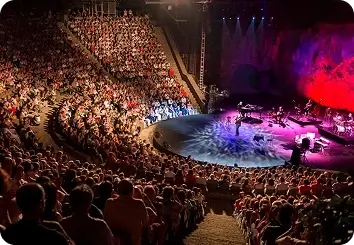
GREC Festival
📍Barcelona
International and local programming. It takes place every July.
Mostra
📍Igualada
Focused on theatre for young audiences
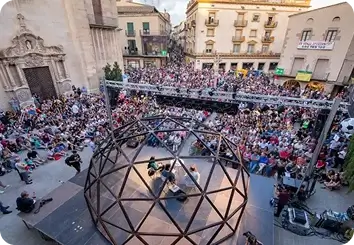
FiraTàrrega
📍Tarrega
Performing arts market that showcases mostly theatre outside of the theater, great for getting your show picked up. It happens around September.
Temporada Alta
📍Girona
Takes place in Girona and its surroundings, and it showcases international and local exciting work. It happens every fall season.
TNT Festival
📍Terrassa
Platform for contemporary creation and risk-taking work.
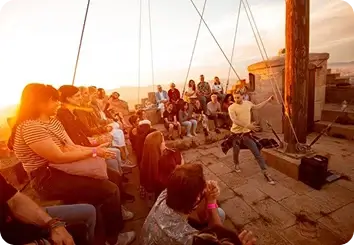
Festival Píndoles
📍Barcelona
Site-specific short plays that take place in unexpected locations. They hold a festival each year in Montjuïc Castle, where they show new show selected from a yearly open call.
Whether you’re acting in something or just attending, these festivals are excellent ways to get a feel for what’s being made and who’s making it.
Conclusion
Barcelona’s theatre scene is a dynamic, constantly evolving, and very much alive blend of tradition and experimentation, rooted in a strong local cultural and political identity while constantly engaging with global artistic practices. As a stage actor in this city, you’ll be entering a creative ecosystem that thrives in talent, collaboration, initiative, and artistic risk-taking. From devising new work in self-produced collectives to auditioning for established companies, from navigating union structures to discovering playwrights, directors and creators whose voices shape the contemporary Catalan stage, there are many ways and paths to engage with this ever-changing and diverse scene.
Don’t get me wrong. It certainly can feel daunting at first. Even frustrating. Especially if you’re not fluent in Catalan (or Spanish). But please don’t let that hold you back. Language can be learned, but curiosity, perseverance, and an open mind are even more essential tools for finding your space as an actor here. Whether you’re joining a cast, starting your own company, or developing new work, there’s room for voices that are authentic, daring, and committed.
So come see some of the work that’s being shown around. Get to know how Catalan theatre is made, who’s making it, and how you can participate in it. The stage in Barcelona is yours to step into.


